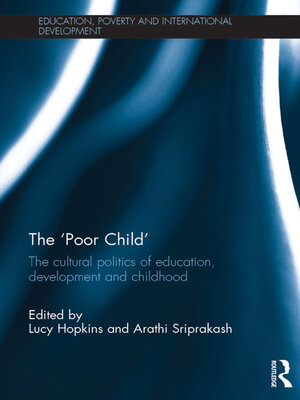The 'Poor Child'
ebook ∣ The cultural politics of education, development and childhood · Education, Poverty and International Development
By Lucy Hopkins

Sign up to save your library
With an OverDrive account, you can save your favorite libraries for at-a-glance information about availability. Find out more about OverDrive accounts.
Find this title in Libby, the library reading app by OverDrive.



Search for a digital library with this title
Title found at these libraries:
| Library Name | Distance |
|---|---|
| Loading... |
The 'poor child' at the centre of development activity is often measured against and reformed towards an idealised and globalised child subject. This book examines why such normative discourses of childhood are in need of radical revision and explores how development research and practice can work to 'unsettle' the global child. It engages the cultural politics of childhood – a politics of equality, identity and representation – as a methodological and theoretical orientation to rethink the relationships between education, development, and poverty in children's lives.
This book brings multiple disciplinary perspectives, including cultural studies, sociology, and film studies, into conversation with development studies and development education in order to provide new ways of approaching and conceptualising the 'poor child'. The researchers draw on a range of methodological frames – such as poststructuralist discourse analysis, arts based research, ethnographic studies and textual analysis – to unpack the hidden assumptions about children within development discourses. Chapters in this book reveal the diverse ways in which the notion of childhood is understood and enacted in a range of national settings, including Kenya, India, Mexico and the United Kingdom. They explore the complex constitution of children's lives through cultural, policy, and educational practices. The volume's focus on children's experiences and voices shows how children themselves are challenging the representation and material conditions of their lives.
The 'Poor Child' will be of particular interest to postgraduate students and scholars working in the fields of childhood studies, international and comparative education, and development studies.







